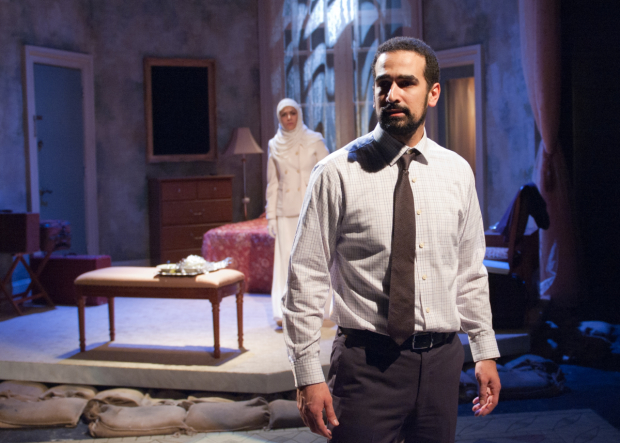Inana

(© Lara Goetsch)
It’s tough to imagine a play more timely than TimeLine Theatre‘s Midwest premiere of Michele Lowe’s Inana. With recent headlines dominated by stories of ancient Syrian artifacts in jeopardy after the Islamic State conquest of Palmyra, Lowe’s drama, set in 2003, follows an Iraqi man’s struggle to save Middle Eastern antiquities and ruins from total destruction as warfare looms between American and Taliban forces.
Lowe’s 90-minute story centers on Yasin (Demetrius Troy), an Iraqi historian, passionate about saving millennia-old sculptures from the ravages of war. While Inana is a love letter to the riches of history and the priceless remnants it leaves behind, it is also a love story about two people. The piece unfolds on the first night of Yasin’s London honeymoon, as he and his second wife, Shali (Atra Asdou), navigate the choppy waters of an arranged marriage that had nothing to do with falling in love.
The more successful of the two love stories belongs to Yasin and his passion for the museum’s artifacts, which he’s determined to protect. The prickly romance between Yasin and Shali has a little soap around the edges. Both new spouses harbor secrets and connections that provide an innovative plot twist in the final third of the play. Shali – whose family connections are gradually revealed to be surprisingly entwined with Yasin’s mission to save art – is a fascinating character worthy of her own play. But although her shocking backstory is a fierce condemnation of the jaw-dropping brutality of Iraq’s ruling class, it also has a whiff of contrivance.
Still, there’s much to admire about Inana. Under Kimberly Senior’s smart, sensitive direction, the production is anchored by the ever-intriguing Demetrious Troy in a much-deserved leading role. Troy, long a rock-solid supporting actor on stages throughout the Midwest, gets a much-deserved spotlight here, and it’s gratifying to see him as the centerpiece of a drama.
Lowe’s title refers to a Mesopotamian deity revered as a goddess associated with both sexual love and chaotic violence. Her likeness, in the form of a sculpture thousands of years old, is as dear to Yasin as his own life – which he risks in order to spirit the sculpture to safety as an American invasion looms and the onset of violence becomes inevitable.
Yasin’s efforts and the context for his devotion to Inana are mostly fleshed out in flashbacks, with the action moving between the London hotel room where he takes his new wife and scenes from Iraq. We meet a bookseller (Frank Sawa) willing to endure torture rather than burn the many books he carries that the Taliban has deemed obscene or heretical. There’s also a clever art forger (Anish Jethmalani) deeply fearful that his smart, headstrong daughter will be killed by the Taliban for her refusal to be submissive. It’s a fear highlighted by the story of Yasin’s beloved first wife, Mena (Arya Daire), whom we see just long enough to get a sense of her strength before she vanishes, presumably taken by the Taliban. Finally, there’s Yasin’s young, hard-working assistant, Mohammed (Behzad Dabu), whose earnest enthusiasm and wide-eyed idealism adds a layer of optimism to Lowe’s dark tale.
The best scenes feature Troy and Asdou. Their awkward, mistrustful relationship evolves tremendously during the course of play, and the chemistry between them is palpable. Asdou is terrific, depicting a woman willing to sublimate herself in order to please her new husband ("I will be as smart as you want me to be," she responds when he comments on her intelligence) but who is also spirited, determined, and opinionated.
One of the places where the story line falters is in the never-quite-clear plans Yasin has made for the artifacts. That’s the mystery that the plot hinges on, but it’s never adequately cleared up. There’s some convoluted discussion of the British Museum and a steel-lined underground bunker in Iraq as well as some murky dialogue with a buttoned up British colleague (Michael B. Woods), but just what Yasin has managed as far as safekeeping is fuzzy. The primary reason to see Inana is for its performances. The cast gives ably depicts the incalculable human cost of destroyed mosques and ravaged artifacts.
Scenic designer Collette Pollard’s upscale hotel room setting is instantly familiar and appropriately anonymous – you could insert the set into a room at the Ramada Inn and guests wouldn’t notice the difference. Charles Cooper’s lighting design intensifies the beauty and the mystery of Inana, often giving the titular sculpture an otherworldly glow that highlights its sacred powers.
Yasin isn’t one to indulge his emotions. But in Troy’s performance, you can see them all subtly, unmistakably flicker across his face as he contends with intensifying crises in both Yasin’s personal and professional life. Though the final blackout in Inana ends the play in a way that isn’t entirely satisfying, the performances within it are, allowing Lowe’s drama to provide a compelling context for an ongoing, real-world tragedy.











